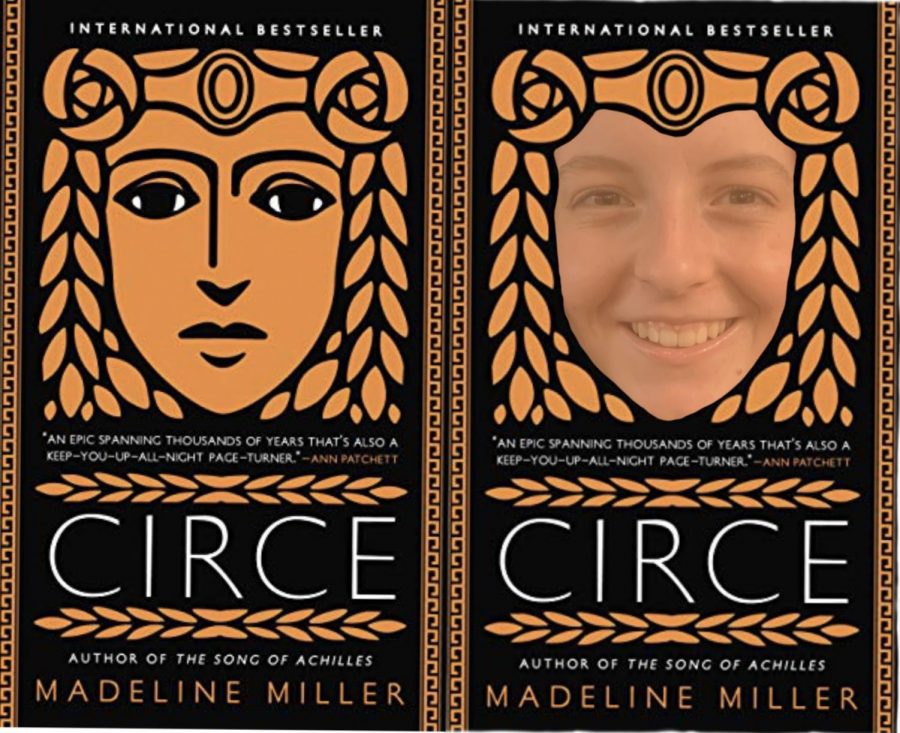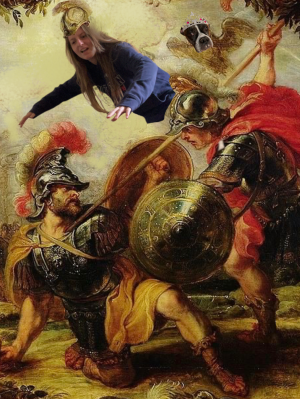Anna’s Book Nook: Circe by Madeline Miller
Junior Anna Keneally gets a little too into the story, Circe, by Madeline Miller.
Be advised, this book contains potentially triggering content including rape; please familiarize yourself with all warnings before reading. When I one day rule the world, I will be sworn in not on a Bible, but instead on Circe by Madeline Miller. If I ever die, I will be buried with the same book. I hope you are catching my drift, if not I will make it as clear as possible: Circe is by far my favorite book I have had the pleasure of reading and now reviewing so far.
Circe is the story of a footnote character in The Odyssey, the goddess who hated being a goddess more than anything. If you are not familiar with The Odyssey, and Percy Jackson by Rick Riordan is more your language, you probably at least know the name. History has not been kind to our protagonist Circe, so Miller takes it upon herself to tell the story of the banished goddess. The book is thousands of years in the making, weaving in and out of beloved myths and building new ones along the way.
We see Circe grow from an outcast, timid, daughter of the Titan Helios into everything she was meant to be and more: not only the witch of Aiaia, but also just herself, Circe. In the book, we are stuck with Circe just as she is stuck on the island Aiaia and only get glimpses of humanity through the weaving of history surrounding characters like Prometheus, Icaras, Daedalus, Jason, the Minotaur and Odysseus. We even get to hear about some old friends, Patroclus and Achilles. Their stories in Circe’s life range from one sentence to a few chapters, which really drives home what mortality is. Circe, for thousands of years, felt stagnant in the universe. She was forced to get glimpses at mortality, only to lose those glimpses in a blink of an eye. “In a solitary life, there are rare moments where another soul dips into yours, as stars once a year brush the earth.” If that sentence alone did not make you want to read this book, you are lying to yourself.
The book changes the lens of mythology. History is written by power too often given to men who villainize powerful women. Homer reduced Circe to nothing more than a seductress who turned men into pigs. As said in the book, “humbling women seems to be a chief pastime of the poets.” Miller, much like in her other book, The Song of Achilles, takes these flat myths and brings in the humanization that they desperately need. She does such a good job with it that Circe seems like an old friend, which made closing the book one final time so much harder.
Circe from start to finish is a story of transformation, whether it be Circe’s transformation and growth throughout the book or the literal transformation of men into pigs. Regardless, it is a celebration of humanity and the changes that humans experience, even through the eyes of a goddess. We are only mortal, frail in comparison to these larger-than-life gods, but we hold so much power in our compassion and insatisfaction. We build relationships, we lose them, we fail, we grow, we feel pain and we try to love in every possible way. Circe is a reminder that the person who tells a story changes the narrative, but it does not change you. So why bother trying to appease the gods and the poets?
Your donation will support the student journalists of Thomas S. Wootton High School. Your contribution will allow us to purchase equipment and cover our annual website hosting costs.
Anna Keneally is a 2022 graduate.










![Junior Grace Song rewatches the trailer for Anora. Promoted as "A Love Story from Sean Baker," it is the eighth feature film under Baker's belt starring Mikey Madison in the titular role. "[Anora] accurately represents women overseen and easily taken advantage of. It emotionally enticed me. The ending is so good," Song said.](https://woottoncommonsense.com/wp-content/uploads/2024/11/Rc5RQTdjtUFtyT7IyQe1rSxkpOTc6NoksY8jtoop-e1732201365565-600x450.jpg)